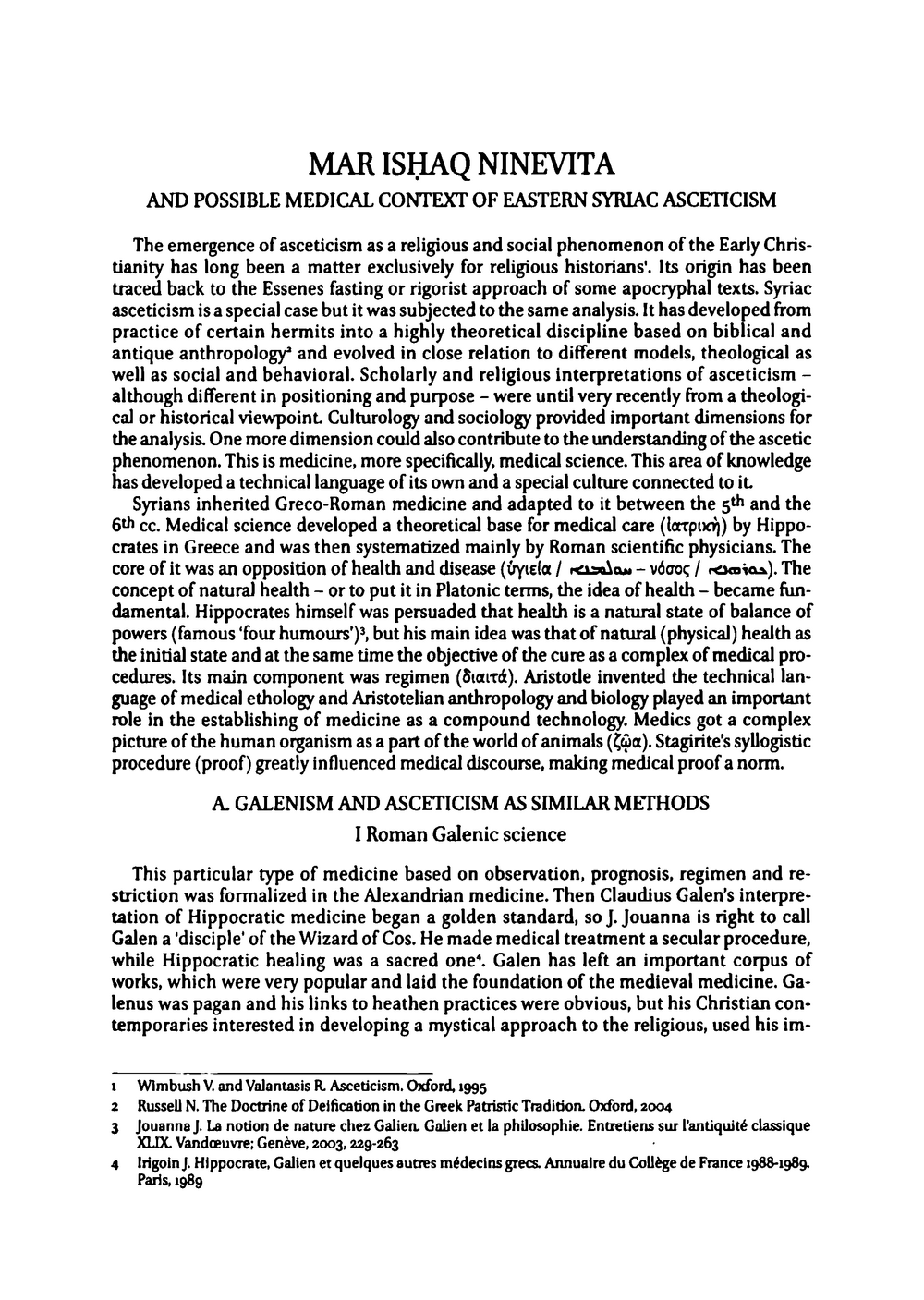MARISHAQ NINEVITA AND POSSIBLE MEDICAL CONTEXT OF EASTERN SYRIAC ASCETICISM The emergence of asceticism as a religious and social phenomenon of the Early Chris-
tianity has long been a matter exclusively for religious historians1. Its origin has been
traced back to the Essenes fasting or rigorist approach of some apociyphal texts. Syriae
asceticism is a special case but it was subjected to the same analysis. It has developed from
practice of certain hermits into a highly theoretical discipline based on biblical and
antique anthropology* and evolved in close relation to different models, theological as
well as social and behavioral. Scholarly and religious interpretations of asceticism -
although different in positioning and purpose - were until very recently from a theologi¬
cal or historical viewpoint Culturology and sociology provided important dimensions for
the analysis. One more dimension could also contribute to the understanding of the ascetic
phenomenon. This is medicine, more specifically, medical Science. This area of knowledge
has developed a technical language of its own and a special culture connected to it Syrians inherited Greco-Roman medicine and adapted to it between the 5^ and the
6di cc. Medical Science developed a theoretical base for medical care (Ιατρική) by Hippo¬
crates in Greece and was then systematized mainly by Roman scientific physicians. The
core of it was an opposition of health and disease (υγιεία / rtisaW - νόσος / c^mio*). The
concept of natura) health - or to put it in Platonic ternis, the idea of health - became fun¬
damenta). Hippocrates himself was persuaded that health is a natural state of balance of
powers (famous ‘four humours’)1 2 3, but his main idea was that of natural (physica!) health as
the initial state and at the same time the objective of the cure as a complex of medical pro-
cedures. Its main component was regimen (δίαιτά). Aristotle invented the technical lan¬
guage of medical ethology and Aristotelian anthropology and biology played an important
role in the establishing of medicine as a compound technology. Medies got a complex
picture of the human organism as a part of the world of animals (ζώα). Stagirite’s syllogistic
procedure (proof) greatly influenced medical discourse, making medical proof a norm. A. GALENISM AND ASCETICISM AS SIMILAR METHODS
I Roman Galenic Science This particular type of medicine based on observation, prognosis, regimen and re-
striction was formalized in the Alexandrian medicine. Then Claudius Galen’s interpre-
tation of Hippocratic medicine began a golden Standard, so J. Jouanna is right to call
Galen a 'disciple' of the Wizard of Cos. Не made medical treatment a secular procedure,
while Hippocratic healing was a sacred one4. Galen has left an important corpus of
works, which were very popular and laid the foundation of the medieval medicine. Ga¬
lenus was pagan and his links to heathen practices were obvious, but his Christian con-
temporaries interested in developing a mystical approach to the religious, used his im- 1 Wlmbush V. and Valantasis R. Asceticism. Oxford. 1995 2 Russell N. The Doctrine of Deiiication in the Greek Patristic Tradition. Oxford, 2004 3 Jouanna J. La notion de nature chez Galien. Galien et la philosophie. Entredens sur l’andquit£ classique
XLEX. Vandoeuvre; Geneve, 2003,229-263 4 lrigoin J. Hippocrate, Galien et quelques a utres m£decins grecs. Annuaire du Collige de France 1986-1989.
Paris, 1989
